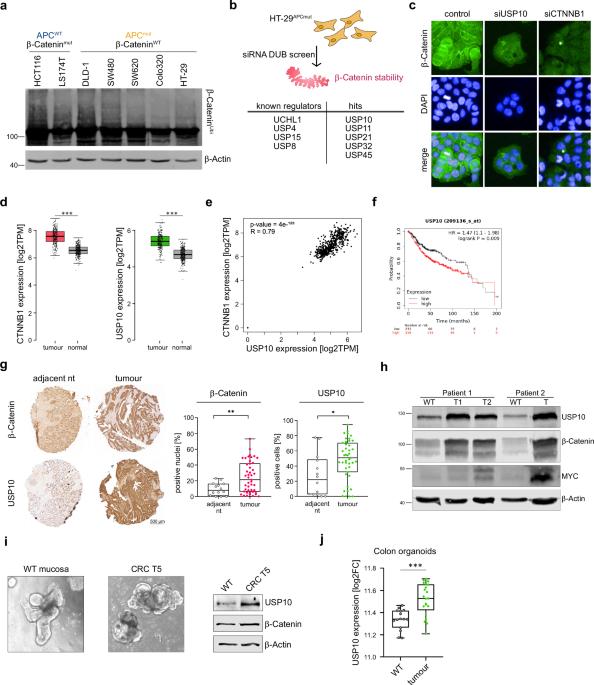USP10 drives cancer stemness and enables super-competitor signalling in colorectal cancer
IF 6.9
1区 医学
Q1 BIOCHEMISTRY & MOLECULAR BIOLOGY
引用次数: 0
Abstract
The contribution of deubiquitylating enzymes (DUBs) to β-Catenin stabilization in intestinal stem cells and colorectal cancer (CRC) is poorly understood. Here, and by using an unbiassed screen, we discovered that the DUB USP10 stabilizes β-Catenin specifically in APC-truncated CRC in vitro and in vivo. Mechanistic studies, including in vitro binding together with computational modelling, revealed that USP10 binding to β-Catenin is mediated via the unstructured N-terminus of USP10 and is outcompeted by intact APC, favouring β-catenin degradation. However, in APC-truncated cancer cells USP10 binds to β-catenin, increasing its stability which is critical for maintaining an undifferentiated tumour identity. Elimination of USP10 reduces the expression of WNT and stem cell signatures and induces the expression of differentiation genes. Remarkably, silencing of USP10 in murine and patient-derived CRC organoids established that it is essential for NOTUM signalling and the APC super competitor-phenotype, reducing tumorigenic properties of APC-truncated CRC. These findings are clinically relevant as patient-derived organoids are highly dependent on USP10, and abundance of USP10 correlates with poorer prognosis of CRC patients. Our findings reveal, therefore, a role for USP10 in CRC cell identity, stemness, and tumorigenic growth by stabilising β-Catenin, leading to aberrant WNT signalling and degradation resistant tumours. Thus, USP10 emerges as a unique therapeutic target in APC truncated CRC.

USP10 在结直肠癌中驱动癌症干性并实现超级竞争信号传导。
人们对去泛素化酶(DUBs)在肠干细胞和结直肠癌(CRC)中稳定β-Catenin的作用知之甚少。在这里,通过无偏见筛选,我们发现DUB USP10能在体外和体内特异性地稳定APC截断的CRC中的β-Catenin。包括体外结合和计算建模在内的机理研究显示,USP10 与 β-Catenin 的结合是通过 USP10 的非结构化 N 端介导的,并被完整的 APC 竞争,从而有利于 β-catenin 降解。然而,在APC截断的癌细胞中,USP10会与β-catenin结合,增加其稳定性,这对维持未分化肿瘤特性至关重要。消除 USP10 会减少 WNT 和干细胞特征的表达,并诱导分化基因的表达。值得注意的是,在小鼠和患者来源的 CRC 有机体中沉默 USP10 证实,它对 NOTUM 信号和 APC 超级竞争者表型至关重要,可降低 APC 截断 CRC 的致瘤特性。这些发现与临床相关,因为患者衍生的器官组织高度依赖于 USP10,而 USP10 的丰度与 CRC 患者较差的预后相关。因此,我们的研究结果揭示了 USP10 在 CRC 细胞特性、干性和肿瘤性生长中的作用,它通过稳定 β-Catenin,导致 WNT 信号异常和抗降解肿瘤。因此,USP10 成为 APC 截断型 CRC 的独特治疗靶点。
本文章由计算机程序翻译,如有差异,请以英文原文为准。
求助全文
约1分钟内获得全文
求助全文
来源期刊

Oncogene
医学-生化与分子生物学
CiteScore
15.30
自引率
1.20%
发文量
404
审稿时长
1 months
期刊介绍:
Oncogene is dedicated to advancing our understanding of cancer processes through the publication of exceptional research. The journal seeks to disseminate work that challenges conventional theories and contributes to establishing new paradigms in the etio-pathogenesis, diagnosis, treatment, or prevention of cancers. Emphasis is placed on research shedding light on processes driving metastatic spread and providing crucial insights into cancer biology beyond existing knowledge.
Areas covered include the cellular and molecular biology of cancer, resistance to cancer therapies, and the development of improved approaches to enhance survival. Oncogene spans the spectrum of cancer biology, from fundamental and theoretical work to translational, applied, and clinical research, including early and late Phase clinical trials, particularly those with biologic and translational endpoints.
 求助内容:
求助内容: 应助结果提醒方式:
应助结果提醒方式:


